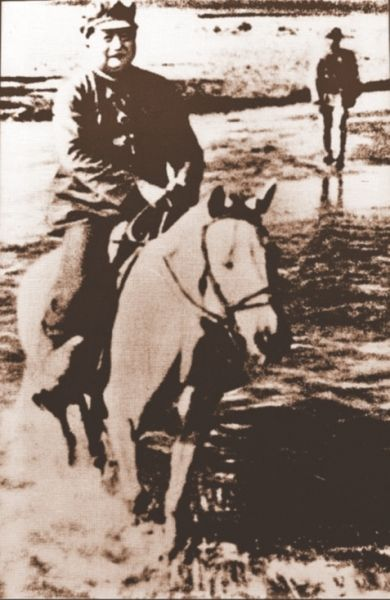In 1934, after Ji Hongchang died, his wife Hu Hongxia sold the house to redeem the body, but who knew that there was a small note in the pocket of her clothes, with a sentence on it, which gave her the courage to survive.
Speaking of which, before Comrade Ji Hongchang became a comrade, he was a soldier among the old feudal warlords.
In that era of frequent wars, for Ji Hongchang, who was born in a poor family, joining the army was already the best choice.
At that time, Feng Yuxiang admired Ji Hongchang very much for his integrity and courage, and he was rapidly promoted under Feng's subordinates, and within a few years, this young man who was exactly 18 years old when he joined the army had become a battalion commander.
In the process, Ji Hongchang came into contact with communist ideology, Marxism-Leninism and other socialist theories, and he agreed with the views in the book.
At that time, the patriotic movement was prevalent in China, and many revolutionaries were actively propagating the way to save the country, and many of them were even younger than Ji Hongchang, which also deeply touched his heart.
As a result, Ji Hongchang gradually awakened in the army that maintained the old feudal system.
Therefore, even in the old army, Ji Hongchang, who was kind and upright by nature, was not affected by the vices of warlords, unlike other officers, Ji Hongchang was frugal and simple, and spent the money he saved on public welfare.
In 1925, only 12 years after joining the army, Ji Hongchang had already become a brigade commander, two years later he was promoted to division commander, and two years later he was already a military commander.
Before that, he was just a poor boy from a poor peasant, without any connections or relationships, and today, Ji Hongchang can be described as a model of self-made, which fully shows that he has outstanding military talent.
Later, Comrade Ji Hongchang himself was the "light" itself.
In 1932, when the Songhu War of Resistance broke out, Comrade Ji Hongchang, who was forced by Chiang Kai-shek to go down because of his resolute resistance to Japan, felt that the country was in trouble.
In the autumn of this year, Comrade Ji Hongchang officially abandoned the darkness and turned to the light, and he was originally a high-ranking official of the old patriotic warlord, "turned into a butterfly" and became a good comrade and an anti-Japanese fighter.
However, although the Kuomintang was indeed anti-Japanese on the surface, behind it was also assassinating the Communist Party members, that is, Chiang's so-called policy of "fighting outside the country must first secure the interior".
In 1934, Comrade Ji Hongchang was running around at that time, actively propagating the anti-Japanese ideology.
At that time, Comrade Ji Hongchang's home was not only a "home", but also a secret liaison office of the party, a printing office for anti-Japanese and party ideological readings.
But he was not tolerated by Chiang Kai-shek, who sent spies to shoot and wound him, and arrested him and tortured him to extract a confession
However, Ji Hongchang, who was born in poverty, endured hardships and stood hard work, and was full of the blood of a soldier, and no matter how the spies tortured him, he could not learn even a single piece of information about the party from the mouth of this resolute and loyal communist fighter.
After several attempts to extract a confession, the enemy decided to kill him.
Comrade Ji Hongchang was unfortunately arrested on 9 November of this year, and only half a month later, impatient spies killed him in the Beiping Army Prison.
At that time, he was in the prime of life, only 39 years old.
And the widely circulated and righteous sentence "The country is still like this, why don't I regret this" is the last poem written by Comrade Ji Hongchang before he bravely took up his righteousness.
After Ji Hongchang became righteous, these military agents also tried to make a lot of money through him, and they threatened Ji Hongchang's wife Hu Hongxia, so Hu Hongxia had to sell her property in exchange for her husband's body.
When sorting out Ji Hongchang's will, Hu Hongxia found a note in her pocket, which was the will left by Ji Hongchang to her, which was also a masterpiece.
The first sentence is "The husband is dying now, and he is sacrificing for the times", which can't help but make people cry, and his tenacious will also gives his wife Hu Hongxia the motivation to work hard to live.
(Information source: "Ji Hongchang: Dan Xin and Blue Blood Fertile China" - Communist Party of China News Network; "Ji Hongchang: Hate not to resist Japan and die, leave it for today's shame" - Guangming Network)
